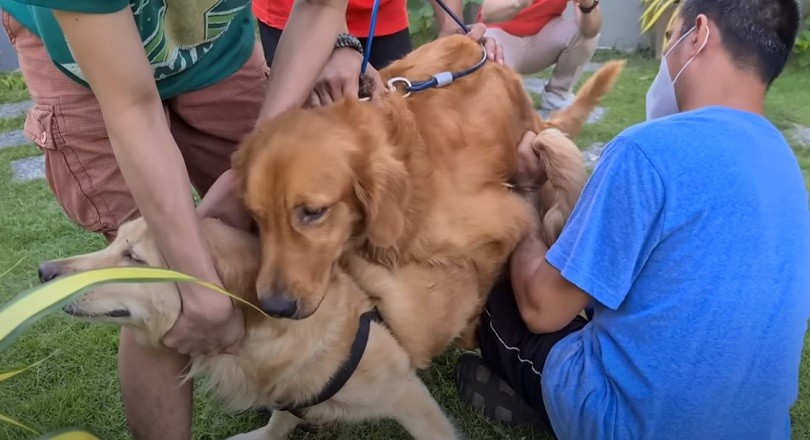Last Updated on February 28, 2025
Neutered dogs cannot ejaculate. The neutering process removes their testicles, which produce sperm and the hormone testosterone.
Neutering is a common procedure for male dogs. It involves the surgical removal of the testicles. This surgery not only prevents reproduction but also reduces certain health risks and behavioral issues. Pet owners often opt for neutering to avoid unwanted litters and to improve their dog’s overall health.
The absence of testicles means that neutered dogs do not produce sperm. This results in the inability to ejaculate. Understanding this helps pet owners make informed decisions about their dog’s health and well-being. Neutering also contributes to the broader effort to control the pet population.
Neutering And Reproductive Function

Neutering is a common procedure for dogs. It involves removing the testicles. Many people wonder about its effects on reproductive functions. One question often asked is: Can neutered dogs ejaculate?
Impact Of Neutering On Ejaculation
Neutering removes the dog’s testicles. This stops the production of sperm. As a result, neutered dogs cannot father puppies. But can they still ejaculate? The answer is yes. Neutered dogs can still ejaculate. The surgery doesn’t remove all glands involved in ejaculation.
The prostate gland remains after neutering. This gland produces fluid that mixes with sperm. Even without sperm, the gland still makes fluid. So, neutered dogs can ejaculate this fluid.
Changes In Hormone Levels
Neutering greatly impacts hormone levels. The testicles produce testosterone. Removing them causes a drop in this hormone. Lower testosterone affects many things. The dog’s behavior, energy levels, and even appearance can change.
Testosterone also plays a role in sexual behavior. Neutered dogs often show less interest in mating. They may not seek out females as much. This decrease in mating behavior is a common reason for neutering.
| Aspect | Before Neutering | After Neutering |
|---|---|---|
| Testosterone Levels | High | Low |
| Sperm Production | Active | None |
| Prostate Gland Function | Active | Still Active |
In summary, while neutered dogs cannot reproduce, they can still ejaculate. Their hormone levels change, which affects many aspects of their life. Understanding these changes helps pet owners make informed decisions.
Behavioral Changes Post-neutering
Neutering your dog can lead to significant behavioral changes. These changes often improve the dog’s quality of life. While the procedure is common, many pet owners have questions. One frequent question is about neutered dogs and ejaculation. This section explores the behavioral changes that occur post-neutering.
Effects On Sexual Behavior
Neutering eliminates the dog’s ability to reproduce. It also reduces sexual behaviors. Male dogs often stop mounting other dogs or objects. They also become less interested in females in heat. Testosterone levels drop significantly, leading to these changes. Some dogs may still display sexual behaviors. This is usually due to habit, not desire.
Impact On Marking And Aggression
Neutering can also impact marking and aggression. Many male dogs mark their territory with urine. This behavior decreases or stops after neutering. Aggressive behavior is another issue neutering can address. Many neutered dogs become less aggressive. They are more likely to be calm and friendly. This is particularly true for dogs that were aggressive due to hormonal influences.
In some cases, behavioral changes can vary. Each dog is unique, and their response to neutering can differ. Consulting a veterinarian can provide more specific insights into your dog’s behavior post-neutering.
Health Considerations For Neutered Dogs
Neutering dogs impact their health significantly. Understanding these impacts helps in making informed decisions. This section delves into the potential health benefits and risks associated with neutering.

Potential Health Benefits
Neutering offers various health benefits for dogs. Some of the key benefits include:
- Reduced risk of certain cancers: Neutering decreases the chances of testicular cancer and prostate issues.
- Behavioral improvements: Neutered dogs often show less aggression and marking behavior.
- Longer lifespan: Studies suggest neutered dogs may live longer.
The procedure can also reduce the risk of infections and diseases. This is because neutering eliminates the organs prone to such conditions.
Risks And Complications
Though neutering offers benefits, there are risks involved. Some of the common complications include:
- Post-surgical infections: Dogs may develop infections at the surgical site.
- Hormonal imbalances: Neutering can lead to hormonal changes affecting the dog’s overall health.
- Weight gain: Neutered dogs may become prone to obesity due to reduced activity levels.
Monitoring the dog’s health post-surgery is crucial. Regular vet check-ups help in identifying and managing potential issues early.
Table: Summary Of Health Considerations
| Aspect | Details |
|---|---|
| Reduced Cancer Risk | Lower risk of testicular and prostate cancer |
| Behavioral Changes | Less aggression and marking behavior |
| Longevity | Potentially longer lifespan |
| Post-Surgical Infections | Possible infections at the surgical site |
| Hormonal Imbalances | Changes affecting overall health |
| Weight Gain | Increased risk of obesity |
Understanding these health considerations helps in making informed decisions. Always consult with a veterinarian for personalized advice.
Frequently Asked Questions
Is It Normal For A Male Dog To Ejaculate?
Yes, it is normal for a male dog to ejaculate. This can happen during mating or due to arousal.
Can A Neutered Male Dog Still Penetrate?
Yes, a neutered male dog can still attempt to mount and penetrate, but it usually cannot reproduce.
Do Neutered Dogs Still Have The Urge To Mate?
Neutered dogs usually lose the urge to mate. Hormones decrease, reducing sexual drive. Some behaviors might persist due to habit.
Can A Neutered Dog Still Lock With A Female?
Yes, a neutered dog can still lock with a female. However, they can’t reproduce.
Can Neutered Dogs Still Ejaculate?
Yes, neutered dogs can still ejaculate but without sperm due to the absence of testicles.
Conclusion
Understanding the changes in a neutered dog’s body can help pet owners manage their expectations. Neutering affects hormonal levels and physical abilities. While some dogs might still exhibit mounting behavior, they generally cannot ejaculate. Always consult your vet for personalized advice and insights.
Proper care ensures a healthy and happy pet.

